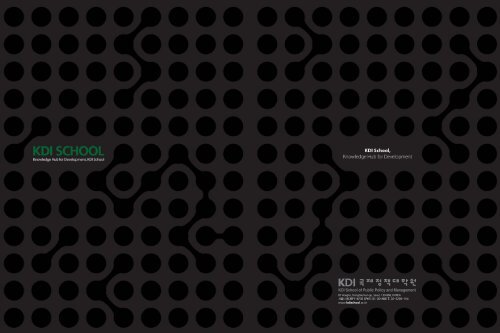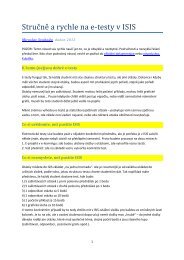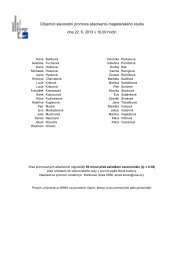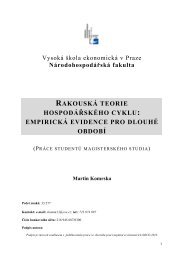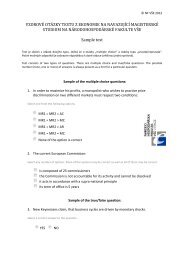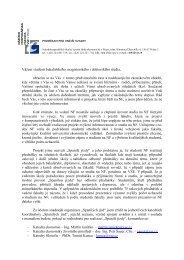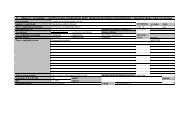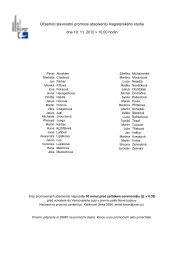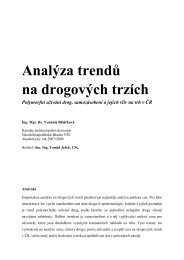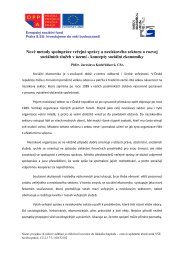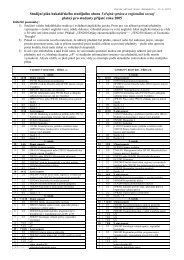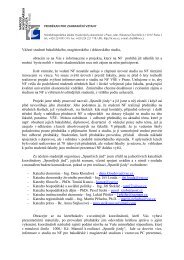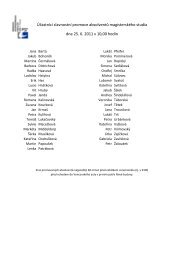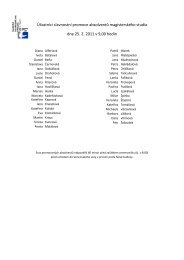You also want an ePaper? Increase the reach of your titles
YUMPU automatically turns print PDFs into web optimized ePapers that Google loves.
서울시 동대문구 회기로 87번지 (우:130-868) T. 02-3299-1114<br />
87 Hoegiro, Dongdaemun-gu, <strong>Seoul</strong>, 130-868, KOREA<br />
www.kdischool.ac.kr
KDI SCHOOL<br />
<strong>Global</strong> leaders<br />
who bring changes to the world<br />
KDI School is devoted to developing global leaders<br />
who create new paradigms to innovate the world.<br />
KDI School Commitments<br />
Excellence in Teaching<br />
Top-notch faculty who combine theory and practice<br />
Innovative curriculum focused on policy-making processes<br />
International Learning Environment<br />
All courses taught in English<br />
International student body with diverse backgrounds<br />
Excellent peer learning and networking opportunities<br />
<strong>Global</strong> Hub for Knowledge Sharing<br />
Sharing of Korea's experience on development and crisis management<br />
Cooperation with numerous partner universities and think-tanks abroad
Knowledge Hub for Development<br />
The 2010 <strong>Seoul</strong> <strong>G20</strong> Summit has positioned Korea at the center of global governance. To help<br />
further the <strong>Seoul</strong> Development Consensus, KDI School aims to foster global partnership in<br />
knowledge-sharing by educating future leaders from around the world. As a leading<br />
educational institute in development and public policy, we have been committed to promoting<br />
sustainable, balanced growth of the world. We now invite you to share our vision and change<br />
the world for the better.<br />
KDI School, Knowledge Hub for Development 04<br />
KDI School<br />
05
KDI School<br />
Contents<br />
2<br />
4<br />
8<br />
Mission & Value<br />
KDI School Commitments<br />
KDI School Values<br />
History & Mission<br />
10<br />
11<br />
Welcoming Message<br />
Message from President<br />
Dean’s Message<br />
14<br />
26<br />
Academic <strong>Program</strong>s<br />
KDI School Academic <strong>Program</strong>s<br />
•MDP<br />
•MPP<br />
•<strong>Seoul</strong> <strong>G20</strong> <strong>Global</strong> Leader’s <strong>Program</strong><br />
•Ph.D. <strong>Program</strong>s<br />
KDI School Faculty<br />
34<br />
36<br />
38<br />
<strong>Global</strong> Network<br />
Students Profile<br />
Overseas Partner Schools<br />
Development Research and Learning Network<br />
44<br />
46<br />
48<br />
50<br />
52<br />
Campus Life<br />
My KDI School Experience<br />
Campus Information<br />
School Activities<br />
Scholarship Opportunities<br />
Admissions for International Students<br />
KDI School, Knowledge Hub for Development<br />
KDI School<br />
06<br />
07
KDI School<br />
History<br />
1997.<br />
12. Founded with an authorization from the Ministry of<br />
Education and Human Resources Development<br />
Mission<br />
Produce international experts with theoretic knowledge and practical skills<br />
in the field of development economics and public policy<br />
Foster future leaders who can cope with rapidly changing international environment<br />
and exercise global leadership in every sector of our society<br />
1998.<br />
03.<br />
07.<br />
Classes begin (4 programs)<br />
Dr. Lim, Gill-Chin inaugurated as the first dean<br />
1999.<br />
01.<br />
11.<br />
12.<br />
2000.<br />
02.<br />
09.<br />
10.<br />
2001.<br />
01.<br />
02.<br />
07.<br />
2002.<br />
01.<br />
10.<br />
Appointed by KOICA (Korea International Cooperation<br />
Agency) as a partner institution<br />
Official name changed from the KDI School of International<br />
Policy and Management to the KDI School of Public Policy and<br />
Management<br />
Designated as an APEC Education Hub<br />
<strong>Global</strong> Master's <strong>Program</strong> (GMP) launched, enabling students to acquire dual degrees<br />
both at the KDI School and abroad<br />
Special <strong>Program</strong> on Economic Policy-Making launched<br />
The Center for National Leadership renamed into the Center for Executive Education<br />
Designated as the Korean Hub of the World Bank’s GDLN (<strong>Global</strong> Development Learning Network)<br />
Ph.D. <strong>Program</strong> launched<br />
Dr. Chung, Chin-Seung inaugurated as the second dean<br />
Master's <strong>Program</strong>s consolidated into the Master of Public Policy (MPP) and Master of Business Administration (MBA) programs<br />
KDI School Alumni Association established<br />
2003.<br />
01. E-Learning program launched<br />
2005.<br />
Digital Library opened 05.<br />
2006.<br />
Master's in Asset Management (MAM) launched 02.<br />
The OECD <strong>Seoul</strong> Center opened<br />
Dr. Hahm, Sang-Moon inaugurated as the fourth dean<br />
MPP program expanded to MPP, MPP/ED, and MPP/PM<br />
Dr. Nam, Sang-Woo inaugurated as the fifth dean<br />
Master's program restrunctured into MDP and MPP<br />
Ph.D. in Development Policy introduced<br />
<strong>Seoul</strong> <strong>G20</strong> <strong>Global</strong> Leader’s <strong>Program</strong> launched<br />
Development Research and Learning Network established<br />
2007.<br />
01.<br />
10.<br />
2010.<br />
01.<br />
12.<br />
2012.<br />
2004.<br />
03.<br />
04.<br />
05.<br />
Designated by the Ministry of Commerce, Industry and Energy to offer a Master's program in Foreign Direct Investment (MFDI)<br />
Dr. Chung, Chin-Seung inaugurated as the third dean<br />
Master’s in Foreign Direct Investment established<br />
KDI School, Knowledge Hub for Development<br />
KDI School<br />
08<br />
09
KDI School<br />
Message from President<br />
KDI School<br />
Dean’s Message<br />
Welcoming Message<br />
Academic <strong>Program</strong>s<br />
The KDI School of Public Policy and Management was founded as an affiliated educational institution of the Korea Development Institute, a<br />
premier government economic think tank at the forefront of social science research for the past 40 years. Drawing from the resources of the<br />
Institute, the KDI School provides an exceptional education that combines current academic theories with comprehensive and innovative practical<br />
research to inform the national vision and other key policy agendas.<br />
HYUN, Oh-Seok<br />
President, KDI School of Public Policy and Management<br />
Nam, Sang-Woo<br />
Dean, KDI School of Public Policy and Management<br />
The KDI School of Public Policy and Management opened in March 1998 with the mission of fostering global leaders in the public and private<br />
sectors at home and abroad. Since then the KDI School has achieved remarkable growth with our inaugural group of 55 students increasing to<br />
about 300 in 2011. The quality of our educational programs and faculty now rivals other internationally renowned institutions, and our alumni<br />
play active roles in diverse sectors including government, public agencies, finance, media, other enterprises, and international organizations.<br />
<strong>Global</strong> Network<br />
Since its inception 14 years ago, the KDI School has achieved remarkable growth and earned prestige nationally and among emerging Asian<br />
countries as the leading graduate school of public policy. We place a major emphasis on enhancing the capabilities of public sector managers to<br />
effectively diagnose and seek solutions for policy issues. Simultaneously, we maintain a keen focus on successfully managing national affairs<br />
through a heightened understanding of the rapidly evolving private sector. To date, we have cultivated over 1,500 next generation leaders in the<br />
public and private sectors.<br />
With a vision to establish itself as the world’s finest public policy school, we have adopted a new educational model centered on two axes: to foster<br />
world-class leaders equipped with academic and practical expertise and to provide systematic research and education especially on the processes of<br />
economic development. Furthermore, we are launching an integrative program in economic development strategy utilizing our education and<br />
research to support official development assistance envisioned by the Korean government, which hosted the <strong>Seoul</strong> <strong>G20</strong> Summit in 2010.<br />
On behalf of the KDI School, I look forward to welcoming talented and promising individuals who aspire to contribute to national and<br />
international development, cooperation and co-prosperity.<br />
The KDI School, by securing a faculty pool with outstanding policy research records, strives to create a rich and interdisciplinary curriculum<br />
which combines state-of-the-art theories and the practices of policymaking and implementation. Moreover, our student body with diverse<br />
professional and cultural backgrounds provides an open educational environment which leads to a well-connected global alumni network<br />
spanning 91 countries. This allows our students to nurture international perspectives and acquire relevant skills for global leadership. The KDI<br />
School also enjoys extensive partnerships with distinguished universities and research institutes around the world for student exchange and other<br />
academic programs.<br />
Furthermore, the KDI School aims to solidify Korea’s global leadership in the development field by furthering the <strong>Seoul</strong> Development<br />
Consensus for Shared Growth endorsed at the <strong>Seoul</strong> <strong>G20</strong> Summit. Accumulated policy research and development consulting experience at KDI<br />
over the last four decades are valuable assets for the KDI School striving to become a world-class academic institution for development policy<br />
studies. We will channel our best efforts in nurturing growth potential and ensuring resilience in developing countries.<br />
The KDI School of Public Policy and Management remains committed to transforming our students into global leaders with a broad perspective<br />
and the capacity of successfully tackling pressing issues in international politics and global economy in a balanced manner between advanced and<br />
developing countries.<br />
Campus Life<br />
KDI School, Knowledge Hub for Development<br />
KDI School<br />
10<br />
11
A New Path to Success<br />
With the passion to begin a new chapter,<br />
Join the KDI School.<br />
With the inspiration to initiate a change,<br />
Create your own success story.<br />
KDI School, Knowledge Hub for Development<br />
KDI School<br />
12<br />
13
KDI School<br />
Academic <strong>Program</strong>s<br />
The KDI School of Public Policy and Management offers Master’s programs and a Ph.D. programs. Our curricula drawn from<br />
accumulated resources of the KDI strive to meet the diverse and professional demands of a constantly changing society.<br />
Welcoming Message<br />
Master’s <strong>Program</strong>s<br />
The Master's programs are divided into full-time and part-time courses. Full-time students are able to complete their coursework by<br />
the end of the first year and usually spend the second year working on their research component. Full-time students are able to<br />
graduate in 18 months. Part-time programs operate in a flexible combination of evening and weekend classes. Part-time students can<br />
graduate within two years without interrupting their careers. Both full-time and part-time courses are available for the MDP and MPP<br />
programs. All classes are conducted in English.<br />
Academic <strong>Program</strong>s<br />
Full-time <strong>Program</strong><br />
Part-time <strong>Program</strong> (Residents in Korea Only)<br />
<strong>Program</strong>s<br />
Concentrations<br />
•MDP: Master of Development Policy<br />
•MPP: Master of Public Policy<br />
•<strong>Global</strong> Finance and Regulation<br />
•Trade and Industrial Policy<br />
•Fiscal and Social Policy<br />
•Regional Development and Environment<br />
•MDP: Master of Development Policy<br />
•MPP: Master of Public Policy<br />
•<strong>Global</strong> Finance and Regulation<br />
•Trade and Industrial Policy<br />
•Entrepreneurship and Private Sector Development<br />
<strong>Global</strong> Network<br />
•<strong>Global</strong> Governance and Political Economy<br />
•Entrepreneurship and Private Sector Development<br />
•Public Management and Leadership<br />
Duration<br />
•1.5 years (4 semesters)<br />
•Coursework: 1 st year at the KDI School<br />
•2 years (6 semesters)<br />
Class Schedule<br />
Tuition<br />
•Thesis Writing: 2 nd year in home country<br />
•Daytime (08:30 - 18:00)<br />
•28,000,000 KRW<br />
•Scholarship opportunities available<br />
•Weekday Evenings (19:00 - 22:30)<br />
+ Saturdays (09:00 - 17:30)<br />
•28,000,000 KRW<br />
•Scholarship opportunities available<br />
Campus Life<br />
<strong>Seoul</strong> <strong>G20</strong> <strong>Global</strong> Leader’s <strong>Program</strong><br />
Hoping to further the <strong>Seoul</strong> Development Consensus endorsed at the <strong>G20</strong> <strong>Seoul</strong> Summit in November 2010, KDI School introduces <strong>Seoul</strong><br />
<strong>G20</strong> <strong>Global</strong> Leader’s <strong>Program</strong>. <strong>Seoul</strong> <strong>G20</strong> <strong>Global</strong> Leader’s Fellowship is a degree program that offers specialized core courses and seminars<br />
that deal with <strong>G20</strong> agendas. Students in this program will be provided with increased scholarship benefit, and can choose to pursue either<br />
MDP or MPP degree. Target students include government officials of division head-level or above or with minimum 6 years of working<br />
experience in the public sector. Korea <strong>Global</strong> Leader’s Fellowship (KGLF) is an executive program for high-level government officials around<br />
the world. Co-operated with the (tentatively named) <strong>G20</strong> <strong>Global</strong> Governance and Development Center, KGLF is designed to raise the core<br />
competence of executives within a year through intensive seminars and research in Korea’s development experience and <strong>G20</strong> agendas.<br />
Ph.D. <strong>Program</strong>s<br />
The KDI School offers Ph.D. in Development Policy and Ph.D. in Public Policy. One-year residency is required for all students, during<br />
which students must take at least 9 classes (27 credits). Afterwards, they are required to pass a comprehensive examination covering<br />
their field of study. Once they pass the exam, students must take 9 more credits (36 credits in total). Upon completing the<br />
coursework students are required to pass an oral examination in their field of study, followed by the submission of a thesis. Starting<br />
from their second year, students have the option of pursuing work and study simultaneously.<br />
*Tuition: Total 25,000,000 KRW (first year: 1,500,000 KRW, second and third year: 5,000,000 KRW respectively, from fourth year on: 1,000,000 KRW per year)<br />
KDI School, Knowledge Hub for Development<br />
KDI School<br />
14<br />
15
Academic <strong>Program</strong>s<br />
Master of Development Policy (MDP)<br />
Based on KDI’s hand-on experience on development policy, the Master of Development Policy (MDP) program examines various<br />
socio-economic issues in both the theoretical and the practical framework. The program provides capacity building for international<br />
professionals, including government officials, development consultants and regional specialists who wish to contribute to<br />
development policymaking. Additional focus falls on fostering professionals in the field of Official Development Assistance (ODA).<br />
Students may declare a concentration from among 7 concentrations but must take development track courses.<br />
l Core Courses l<br />
•Analysis of Market and Public Policy<br />
•Introduction to Research Methods<br />
Welcoming Message<br />
Academic <strong>Program</strong>s<br />
l Development Track Courses l<br />
Korean Economic Development<br />
Finance and Development<br />
Development Economics<br />
<strong>Global</strong> Governance & Development<br />
Institution and Sustainable Development<br />
Aid and Development<br />
Evaluation of Development Projects<br />
Development Assistance and Role of NGOs<br />
Macroeconomic Policy<br />
Development Policy in <strong>Global</strong> Economy<br />
Growth Theory and Strategy<br />
Selected Topics in International Development<br />
<strong>Global</strong> Network<br />
Campus Life<br />
KDI School, Knowledge Hub for Development<br />
KDI School<br />
16<br />
17
Campus Life<br />
<strong>Global</strong> Network<br />
Academic <strong>Program</strong>s<br />
Welcoming Message<br />
Academic <strong>Program</strong>s<br />
Master of Public Policy (MPP)<br />
The Master of Public Policy (MPP) program is designed to provide a global perspective and professional expertise in public policy areas.<br />
The program is highly regarded both in and outside Korea, particularly among developing nations and government officials. The<br />
faculty with outstanding research backgrounds and empirical knowledge offer a leading curriculum that integrates theory and<br />
practice. Students may declare a concentration from among 7 concentrations upon completing 39 credits toward their graduation<br />
requirements.<br />
The highly diverse student composition provides a unique educational environment. Both domestic and international students from all<br />
walks of life, including the government, the media and NGOs are able to share ideas, knowledge and experiences, and build a<br />
dynamic global network.<br />
l Core Courses l<br />
•Analysis of Market and Public Policy<br />
•Quantitative Methods<br />
KDI School, Knowledge Hub for Development<br />
KDI School<br />
18<br />
19
Academic <strong>Program</strong>s<br />
Concentrations for Master’s <strong>Program</strong>s<br />
Concentrations<br />
Welcoming Message<br />
l <strong>Global</strong> Finance and Regulation l<br />
l Fiscal and Social Policy l<br />
l <strong>Global</strong> Governance and Political Economy l<br />
l Public Management and Leadership l<br />
The concentration on <strong>Global</strong> Finance and Regulation aims to help students<br />
understand the theory, the practice, and the policy issues in the areas of<br />
macroeconomics and finance. Target students include mid-career professionals in<br />
finance ministries, central banks, financial supervisory authorities, self-regulatory<br />
agencies, and others who aspire to work in such institutions. The rich list of<br />
finance courses can also meet the needs of students from the private sector.<br />
Upon completion, students are expected to have a full understanding of two key<br />
agendas in recent <strong>G20</strong> summits: global imbalance and international financial<br />
regulatory system.<br />
Selected Courses Offered:<br />
Macroeconomic Policy<br />
International Financial Policy<br />
Central Banking: Monetary Policy Strategy<br />
Bond and FX Market Policy<br />
<strong>Global</strong> Financial Crisis and East Asia<br />
Financial Instruments and Markets<br />
Financial Derivatives<br />
Financial Regulation and Supervision<br />
Credit Markets and Risk Management<br />
Political Economy of Restructuring: Case of Korea<br />
Capital Markets and Investment<br />
Investment Management<br />
Real Estate Finance and Investment<br />
The market is an indispensable mechanism for efficient resource allocation and<br />
long-term growth. The workings of the market, however, are often accompanied<br />
by extreme poverty, externalities, information asymmetry, and coordination<br />
failures, thereby entrapping vulnerable individuals and communities at a lower<br />
end of possible equilibria. To promote efficiency, equity and solidarity is a<br />
significant goal of public policy in this light. On the basis of economics and other<br />
social science disciplines, this concentration explores ways to tackle these<br />
challenges through taxes, government expenditures, and prudent regulations.<br />
Target students include mid-career professionals working in the fields of fiscal<br />
policy, poverty alleviation, education, healthcare, social insurances, labor<br />
protection, and cultural policy.<br />
Selected Courses Offered:<br />
Public Finance and Public Policy<br />
Taxation and Public Policy<br />
Economic Crisis and Fiscal Management<br />
Cost Benefit Analysis<br />
Education and Human Resource Development<br />
Labor Market Theory and Policy<br />
Healthcare Policy<br />
Poverty and Social Policy<br />
Civil Society and Social Capital<br />
Population and Migration<br />
Cultural Policy<br />
Public Expenditure Management<br />
As the challenges of development and public policy are inexorably connected<br />
with the forces of globalization, to study them requires an interdisciplinary<br />
approach. This concentration focuses on the reciprocity between politics and<br />
economics, investigating how political factors influence economic processes and<br />
vice versa. The concentration aims to educate mid-career professionals and future<br />
public servants to acquire analytical skills, intellectual depth and high public<br />
spiritedness, necessary to play a leading role in the increasingly global,<br />
interdependent field of policymaking.<br />
Selected Courses Offered:<br />
<strong>Global</strong>ization, Development and the State<br />
<strong>Global</strong> Governance and Diplomatic Practice<br />
Middle Powers in <strong>Global</strong> Governance<br />
International Relations in Northeast Asia<br />
Political Economy of Northeast Asia: Theory and Practice<br />
Foreign Policy Analysis<br />
Resource Diplomacy<br />
U.S. Foreign and Trade Policy<br />
Advanced Seminar in Comparative Politics and Development<br />
Democracy and Development<br />
The Political Foundations of Development<br />
Selected Topics in Area Studies: China in a <strong>Global</strong> Political Economy<br />
Strategic management and leadership skills are in growing demand for managing<br />
public sector organizations, which are characterized by binding mission and<br />
mandates, limited internal capacity, and resources constraints, and external<br />
political environment. On top of providing essential management theories and<br />
analytical tools, this concentration is designed to develop a keen insight through<br />
case studies and build up practical skills to solve real-world problems, including<br />
conflicts resolution and public sector management.<br />
Selected Courses Offered:<br />
Managerial Accounting<br />
Human Resource Management in Government<br />
Leadership and Ethics<br />
Strategic Management for Public Organization<br />
Strategic Approach to Public Management<br />
Public Management Innovation and Reform<br />
Public Management for Socio-economic Development<br />
<strong>Program</strong> Evaluation and Performance Measurement<br />
Participatory Governance in Public Decision Making<br />
Dispute Resolution and Negotiation<br />
Marketing in the Public Sector<br />
E-Governance Strategy<br />
Information System Development for the Public Sector<br />
Development Assistance and Role of NGOs<br />
Institution and Sustained Development<br />
Academic <strong>Program</strong>s<br />
<strong>Global</strong> Network<br />
l Trade and Industrial Policy l<br />
In this era of globalization, no country can enjoy economic prosperity without<br />
engaging in international trade. While domestic industries struggle to adjust<br />
themselves in the global market, industrial policy can facilitate the process.<br />
This concentration aims to offer theoretical knowledge and practical skills in the field<br />
of international trade and industrial policy. Legal and institutional arrangements in<br />
the world trade will be analyzed in the context of contemporary issues such as FTA,<br />
FDI, international trade negotiations, dispute resolutions, and etc.<br />
Target students include mid-career professionals in trade-related ministries and<br />
business entities or international organizations, as well as those students who aspire<br />
to work in such institutions upon graduation.<br />
Selected Courses Offered:<br />
International Trade: Theory and Policy<br />
Understanding the World Economy<br />
Understanding the World Trading System<br />
Foreign Direct Investment<br />
Trade Promotion and Industrial Development<br />
Market Economy and Government<br />
Competition and Industrial Policy<br />
Regulation and State-owned Enterprises<br />
Policies for Small-and Medium-sized Enterprises<br />
Resource and Energy Policy<br />
Science, Technology and Innovation<br />
Bargaining, Auctions and Procurement<br />
Competitive Strategy<br />
l Regional Development and Environment l<br />
Sustainable Development and Green Growth are keywords in the 21 st century<br />
development discourse. Leaders in the public sector need to understand the<br />
dynamic relations among economic development, environmental protection and<br />
societal development.<br />
With this concentration, students develop the knowledge and skills to 1) draft<br />
regional development projects and policies considering environmental<br />
consequences, 2) conduct environmental impact assessments, 3) facilitate<br />
stakeholder participation and orchestrate environmental dispute resolution, and<br />
4) understand complex policymaking procedures in regional development and<br />
environmental management programs.<br />
Graduates may find positions as local or regional development planners and<br />
decision makers, environmental analysts in state, national, and international<br />
agencies and NGOs, or infrastructure development in the private sector.<br />
Selected Courses Offered:<br />
Climate Change, Green Growth, and Environmental Policy<br />
Green Growth and Urban Governance<br />
Sustainable Energy Policy<br />
Urban Transportation Policy<br />
Agriculture and Rural Development<br />
Environmental Dispute Resolution and Negotiation<br />
Project Planning and Environmental Assessment in Developing Countries<br />
Economic Analysis of Investment Operations<br />
Urban Economics<br />
Real Estate and Government Policy<br />
Real Estate Development and Operation<br />
l Entrepreneurship and Private Sector Development l<br />
Entrepreneurship and private sector development are the key drivers of economic<br />
growth, job creation, and poverty reduction. This concentration aims to provide<br />
students with the theoretical knowledge, policy perspectives and practical skills in<br />
the emerging field of entrepreneurship and private sector development. Some of<br />
the key issues include the role of entrepreneurship in economic development,<br />
government policies to promote entrepreneurship, firm-level strategies for growth<br />
and innovation, and international comparison of entrepreneurship policies and<br />
strategies. Target students include government policy makers, public and private<br />
sector managers, and future entrepreneurs interested in this dynamic field.<br />
Selected Courses Offered:<br />
Entrepreneurship and Development<br />
Private Sector Development in Developing Countries<br />
Foreign Direct Investment<br />
Technology Strategy and Public Policy<br />
IT for Development<br />
M&A and Privatization<br />
Corporate Financial Policy<br />
Corporate Governance Policy<br />
Sustainable Strategy for Business<br />
<strong>Global</strong> Business Management<br />
Negotiation for Managers<br />
Customer Relationship Management<br />
Financial Accounting<br />
Financial Statement Analysis and Valuation<br />
Social Entrepreneurship for Development<br />
Campus Life<br />
KDI School, Knowledge Hub for Development<br />
KDI School<br />
20<br />
21
Academic <strong>Program</strong>s<br />
<strong>Seoul</strong> <strong>G20</strong> <strong>Global</strong> Leader’s <strong>Program</strong><br />
Welcoming Message<br />
Background<br />
By hosting the <strong>G20</strong> Summit in November 2011, Korea has reestablished itself in the <strong>Global</strong> Governance scene, playing a<br />
leading role in the entire process of decision-making. One of the biggest achievements was to have <strong>Seoul</strong> Development<br />
Consensus endorsed, whereby <strong>G20</strong> nations pledged to commit themselves to promoting sustainable economic growth and<br />
resilience of the developing world. Sharing development knowledge has been underscored as one of the nine key pillars of<br />
the Consensus.<br />
Academic <strong>Program</strong>s<br />
On the other hand, Korea has joined the OECD Development Assistance Committee in 2010 as one of the few countries<br />
that transformed themselves from an ODA beneficiary to a benefactor. Informed by its experience of becoming an industrial<br />
powerhouse in merely half a century, Korea is expected to share its development knowhow with the developing world.<br />
To support the government efforts in fulfilling this mandate and to help solidify Korea’s global leadership in the<br />
development discourse, KDI School introduces <strong>Seoul</strong> <strong>G20</strong> <strong>Global</strong> Leader’s <strong>Program</strong>. Through this program we intend to<br />
share our accumulated knowledge on development policy and advance the achievements of the <strong>Seoul</strong> Summit.<br />
<strong>Global</strong> Network<br />
<strong>Seoul</strong> <strong>G20</strong> <strong>Global</strong> Leader’s Fellowship<br />
•Eligibility: Division head-level or above or minimum 6 years of working experience in the public sector<br />
•Degree Type: MDP or MPP<br />
•Special Feature: Increased scholarship benefits as <strong>Seoul</strong> <strong>G20</strong> <strong>Global</strong> Leader Scholar<br />
•Contents: Specialized core courses and seminars in development issues<br />
Campus Life<br />
Korea <strong>Global</strong> Leader’s Fellowship (KGLF)<br />
•Eligibility: High-level government officials from <strong>G20</strong> and developing countries<br />
•Type: Executive <strong>Program</strong> (non-degree)<br />
•Contents: <strong>G20</strong> agendas and Korea’s development experience<br />
KDI School, Knowledge Hub for Development<br />
KDI School<br />
22<br />
23
Campus Life<br />
<strong>Global</strong> Network<br />
Academic <strong>Program</strong>s<br />
Welcoming Message<br />
Academic <strong>Program</strong>s<br />
Ph.D. <strong>Program</strong><br />
The KDI School offers Ph.D. in Development Policy and Ph.D. in Public Policy. The goal of the Ph.D. program is to prepare qualified<br />
candidates to produce cutting-edge research in their chosen field and to give them the skills they need to ascend to leadership<br />
positions in the public or private sector.<br />
Target students are individuals with both the demonstrated potential for research and the ability to thrive in a relatively unstructured<br />
environment. Applicants are also expected to have a research topic firmly in hand.<br />
Curriculum Tailored to Your Research Topic<br />
The KDI School encourages Ph.D. students to take the initiative in shaping their own course of study. Supervised reading,<br />
research courses and 1-to-1 or small-group teaching allow a high level of flexibility and a short residency requirement.<br />
Faculty Involvement<br />
The KDI School also encourages Ph.D. students to collaborate with the faculty on research projects. This collaboration,<br />
along with an emphasis on supervised reading and research courses, naturally forms an environment where students work<br />
closely with professors.<br />
KDI School, Knowledge Hub for Development<br />
KDI School<br />
24<br />
25
KDI School Faculty<br />
For the past 14 years or so, the reputation of the KDI School has largely relied on its strongest asset--its faculty members.<br />
Having received degrees from some of the most renowned universities in the world, the faculty pool not only possesses a<br />
rich accumulation of theory and knowledge but also practical experiences, all of which contribute to enriching our<br />
education programs.<br />
KDI School, Knowledge Hub for Development<br />
KDI School<br />
26<br />
27
KDI School Faculty<br />
Name<br />
Nam, Sang-Woo<br />
Cho, Man<br />
Cho, Dongchul<br />
Cho, Yoon C.<br />
Choi, Tae-Hee<br />
Hahm, Sang-Moon<br />
Han, Joong Ho<br />
Jeong, Hyeok<br />
Jung, Kwon<br />
Kang, Younguck<br />
Kim, Dong-Young<br />
Kim, Ji-Hong<br />
Kim, Joon-Kyung<br />
Kim, Taejong<br />
Kim, Woochan<br />
Lee, Jinsoo<br />
Lee, Ju-Ho<br />
Lee, Kun-Ho<br />
Lee, Seung-Joo<br />
Mansury, Yuri S.<br />
Moon, Seongwuk<br />
Nam, Il-Chong<br />
Park, Hun Joo<br />
Park, Jin<br />
Rhee, Kieun<br />
Shin, Jaeun<br />
Sohn, Wook<br />
Yoo, Ilho<br />
Yoo, Yoon-Ha<br />
You, Jong-Il<br />
Education<br />
Ph.D. Massachusetts Institute of Technology<br />
Ph.D. University of Pennsylvania<br />
Ph.D. University of Wisconsin, Madison<br />
Ph.D. Rutgers University<br />
Ph.D. The Ohio State University<br />
Ph.D. University of Chicago<br />
Ph.D. University of Illinois, Urbana-Champaign<br />
Ph.D. University of Chicago<br />
Ph.D. University of Illinois, Urbana-Champaign<br />
Ph.D. New York University<br />
Ph.D. Massachusetts Institute of Technology<br />
Ph.D. UC Berkeley<br />
Ph.D. UC San Diego<br />
Ph.D. Massachusetts Institute of Technology<br />
Ph.D. Harvard University<br />
Ph.D. Georgia Institute of Technology<br />
Ph.D. Cornell University<br />
Ph.D. University of Minnesota<br />
Ph.D. Harvard University<br />
Ph.D. Cornell University<br />
Ph.D. Northwestern University<br />
Ph.D. University of Michigan, Ann Arbor<br />
Ph.D. UC Berkeley<br />
Ph.D. University of Pennsylvania<br />
Ph.D. Columbia University<br />
Ph.D. Texas A&M University<br />
Ph.D. Columbia University<br />
Ph.D. University of Pennsylvania<br />
Ph.D. UCLA<br />
Ph.D. Harvard University<br />
Professional Field<br />
Dean of the KDI School<br />
Development Economics / Macroeconomics<br />
Economics / Managerial Science<br />
Macroeconomics / International Finance<br />
Marketing / Electronic Commerce Marketing<br />
Accounting<br />
International Finance / Monetary Policy<br />
Finance<br />
Economic Growth and Development<br />
Marketing<br />
Policy Analysis / Public Finance<br />
Public Dispute Resolution / Environmental Planning<br />
International Business<br />
Finance / Money & Banking<br />
Public Finance<br />
Corporate Governance / Asset Management<br />
Investment / International Finance<br />
Labor Economics<br />
Finance<br />
Corporate Strategy / FDI<br />
Regional Science / Income Distribution<br />
Technological Innovation / Strategic Management /<br />
Managerial Economics<br />
Industrial Organization / Competition Policy<br />
Political Economics / International Relations<br />
Development Economics / Government Reform<br />
Industrial Organization<br />
Health Economics<br />
Banking / Finance / Monetary Policy<br />
Public Finance / Fiscal Policy<br />
Macroeconomic Policy / Economic Development<br />
Macroeconomics / Development Policy<br />
KDI School, Knowledge Hub for Development<br />
KDI School<br />
28<br />
29
Visiting<br />
Adjunct Faculty<br />
Visiting<br />
Adjunct Faculty<br />
Name<br />
Ahn, Byung-Joon<br />
Chang, Yu-Sang<br />
Cho, Won Dong<br />
Chung, Wankyo<br />
Hsu, Victor W.C.<br />
Kang, Dong Soo<br />
Kang, Moon-Soo<br />
Kim, Duol<br />
Kim, Hisam<br />
Kim, Jay-Hyung<br />
Kim, Jungwook<br />
Kim, Kyong-Dong<br />
Kim, Yong-Seong<br />
Education<br />
Ph.D. Columbia University<br />
Ph.D. Washington University<br />
Ph.D. Oxford University<br />
Ph.D. Texas A&M University<br />
M. Div. Union Theological Seminary<br />
Ph.D. University of Chicago<br />
Ph.D. University of Minnesota<br />
Ph.D. UCLA<br />
Ph.D. University of Wisconsin-Madison<br />
Ph.D. University of Chicago<br />
Ph.D. University of Wisconsin-Madison<br />
Ph.D. Cornell University<br />
Ph.D. Michigan State University<br />
Professional Field<br />
International Relations<br />
Operations Management / Management of Technology<br />
Economics / International trade and trade policies<br />
Health Economics / Human Resource Economic<br />
NGO<br />
Macro-finance / Financial Engineering<br />
Macroeconomics / Economic Development<br />
Industrial Organization / Law and Economics<br />
Public Economics / Labor Economics<br />
Public Finance / Urban/Regional Economics<br />
Advanced Micro Economics / Auction Theory<br />
Industrial Sociology<br />
Labor Economics<br />
Name<br />
Lee, Sung-Joo<br />
Lee, Young-Ki<br />
Lee, Yong S.<br />
Lim, Wonhyuk<br />
Lim, Youngjae<br />
Michell, Anthony<br />
Oh, Byungho<br />
Sakai, Stanley P.<br />
Shragge, Abraham<br />
Shim, Sang-Dal<br />
Suh, Joonghae<br />
Yoo, Jungho<br />
Yoo, Hanwook<br />
Education<br />
M.A. International Institute of Public Administration<br />
Ph.D. Boston University<br />
Ph.D. University of Colorado, Boulder<br />
Ph.D. Stanford University<br />
Ph.D. University of Chicago<br />
Ph.D. Cambridge University<br />
Ph.D. Massachusetts Institute of Technology<br />
M.A. Harvard University<br />
Ph.D. UC San Diego<br />
Ph.D. University of Minnesota<br />
Ph.D. UCLA<br />
Ph.D. University of Wisconsin, Madison<br />
Ph.D. Duke University<br />
Professional Field<br />
Trade Law and Policy<br />
Finance / Economics<br />
Public Administration / Organizational Theory<br />
Economic History / State-owned Enterprise Policy<br />
Competition Policy / Financial System<br />
International Investment / International Marketing<br />
Real Estate Finance / Urban Planning<br />
M&A / IT Strategy<br />
Civil Society and Human Capital<br />
Business Forecast / Macroeconomic Policy<br />
Innovation and Economic Development / International Trade<br />
International Trade / Economic Development<br />
Microeconomics / Public Finance<br />
Koh, Young-Sun<br />
Ph.D. Stanford University<br />
Fiscal and Welfare Policies<br />
Lee, Gina<br />
M.A. Yonsei University<br />
English Language Education<br />
Lee, Kye-Woo<br />
Ph.D. Michigan State University<br />
Economics / Economic Development<br />
Lee, Sun-Ja<br />
M.A. Yonsei University<br />
Korean Language Education<br />
A commemorative photograph of Korean President Lee Myung-Bak at the KDI School<br />
(February 25, 2010)<br />
KDI School, Knowledge Hub for Development<br />
KDI School<br />
30<br />
31
Network of KDI School<br />
Diverse Alumni and Innovative Learning Environment<br />
The KDI School prides itself in alumni with exceptionally diverse cultural and professional backgrounds, as well as a learning<br />
environment that reinforces global cooperation.<br />
KDI School, Knowledge Hub for Development 32<br />
A commemorative photograph of Korean President Lee Myung-Bak visiting a KDI School class<br />
KDI School<br />
(February 25, 2010)<br />
33
KDI School Network<br />
Students Profile<br />
Public & Private Sector<br />
27%<br />
Government Officials<br />
21%<br />
Undergraduate,<br />
Media, NGO<br />
5%<br />
Europe<br />
12%<br />
America<br />
5%<br />
Oceania<br />
2%<br />
Collage Graduates<br />
8%<br />
Private Corp.<br />
11%<br />
NGO / IGO<br />
4%<br />
Financial Inst.<br />
2%<br />
Public Org.<br />
2%<br />
Public Corp.<br />
2%<br />
Welcoming Message<br />
Academic <strong>Program</strong>s<br />
International<br />
Students<br />
47%<br />
Africa<br />
22%<br />
2011 Master’s Students 2011 International Students:<br />
2011 International Students:<br />
Region of Origin<br />
Professional Affiliation<br />
International Students Categorized by Nationality (Master’s & Diploma Students, 1998~2011)<br />
Asia<br />
59%<br />
Government<br />
71%<br />
<strong>Global</strong> Network<br />
No<br />
1<br />
2<br />
3<br />
4<br />
5<br />
6<br />
7<br />
8<br />
9<br />
10<br />
11<br />
12<br />
13<br />
14<br />
15<br />
16<br />
17<br />
18<br />
19<br />
20<br />
21<br />
22<br />
23<br />
Country<br />
Afghanistan<br />
Albania<br />
Algeria<br />
Australia<br />
Azerbaijan<br />
Bangladesh<br />
Bhutan<br />
Bosnia and Herzegovina<br />
Brazil<br />
Bulgaria<br />
Cambodia<br />
Cameroon<br />
Canada<br />
Chile<br />
China<br />
Colombia<br />
Congo<br />
Cote d’lvoire<br />
Costa Rica<br />
Czech Republic<br />
Dominican Republic<br />
Ecuador<br />
East Timor<br />
Total<br />
9<br />
1<br />
4<br />
1<br />
4<br />
38<br />
8<br />
2<br />
1<br />
3<br />
45<br />
5<br />
16<br />
1<br />
70<br />
6<br />
1<br />
3<br />
4<br />
18<br />
2<br />
2<br />
2<br />
No<br />
24<br />
25<br />
26<br />
27<br />
28<br />
29<br />
30<br />
31<br />
32<br />
33<br />
34<br />
35<br />
36<br />
37<br />
38<br />
39<br />
40<br />
41<br />
42<br />
43<br />
44<br />
45<br />
46<br />
Country<br />
Egypt<br />
El Salvador<br />
Eritrea<br />
Ethiopia<br />
Fiji Islands<br />
France<br />
Georgia<br />
Germany<br />
Ghana<br />
Greece<br />
Guatemala<br />
Honduras<br />
Hungary<br />
India<br />
Indonesia<br />
Iran<br />
Iraq<br />
Japan<br />
Jordan<br />
Kazakhstan<br />
Kenya<br />
Kyrgyzstan<br />
Laos<br />
Total<br />
8<br />
2<br />
1<br />
32<br />
5<br />
8<br />
1<br />
24<br />
13<br />
1<br />
8<br />
2<br />
8<br />
7<br />
43<br />
5<br />
52<br />
2<br />
1<br />
23<br />
8<br />
7<br />
16<br />
No<br />
47<br />
48<br />
49<br />
50<br />
51<br />
52<br />
53<br />
54<br />
55<br />
56<br />
57<br />
58<br />
59<br />
60<br />
61<br />
62<br />
63<br />
64<br />
65<br />
66<br />
67<br />
68<br />
69<br />
Country<br />
Lithuania<br />
Malawi<br />
Malaysia<br />
Maldives<br />
Mexico<br />
Mongolia<br />
Myanmar<br />
Namibia<br />
Nepal<br />
Netherlands<br />
New Zealand<br />
Nigeria<br />
Pakistan<br />
Palestine<br />
Panama<br />
Paraguay<br />
Peru<br />
Philippines<br />
Poland<br />
Romania<br />
Russia<br />
Rwanda<br />
Serbia<br />
Total<br />
5<br />
4<br />
4<br />
6<br />
3<br />
33<br />
16<br />
1<br />
11<br />
3<br />
1<br />
4<br />
25<br />
3<br />
1<br />
2<br />
5<br />
17<br />
3<br />
10<br />
17<br />
2<br />
3<br />
No<br />
70<br />
71<br />
72<br />
73<br />
74<br />
75<br />
76<br />
77<br />
78<br />
79<br />
80<br />
81<br />
82<br />
83<br />
84<br />
85<br />
86<br />
87<br />
88<br />
89<br />
90<br />
91<br />
Country<br />
Singapore<br />
Slovakia<br />
South Africa<br />
Sri Lanka<br />
Sudan<br />
Sweden<br />
Taiwan<br />
Tajikistan<br />
Tanzania<br />
Thailand<br />
Tunisia<br />
Turkey<br />
Turkmenistan<br />
Uganda<br />
UK<br />
Ukraine<br />
USA<br />
Uzbekistan<br />
Vietnam<br />
Yemen<br />
Zambia<br />
Zimbabwe<br />
Total<br />
1<br />
7<br />
2<br />
12<br />
2<br />
14<br />
1<br />
4<br />
14<br />
13<br />
4<br />
3<br />
1<br />
6<br />
2<br />
1<br />
21<br />
32<br />
62<br />
2<br />
3<br />
2<br />
Total l 911<br />
Campus Life<br />
KDI School, Knowledge Hub for Development<br />
KDI School<br />
34<br />
35
KDI School<br />
Overseas Partner Schools<br />
Nation<br />
USA<br />
Canada<br />
Chile<br />
Mexico<br />
France<br />
Germany<br />
Italy<br />
Netherlands<br />
Spain<br />
Sweden<br />
UK<br />
China<br />
Japan<br />
Singapore<br />
Australia<br />
Institution<br />
Cornell University<br />
Duke University<br />
Hawaii Pacific University (HPU)<br />
Hult International Business School<br />
Indiana University<br />
Michigan State University (MSU)<br />
New York University (NYU)<br />
Rutgers University (State University of New Jersey)<br />
St. Louis University (SLU)<br />
Syracuse University<br />
The Frederick S. Pardee RAND Graduate School<br />
University at Albany, State University of New York (SUNY)<br />
University of California, San Diego (UCSD)<br />
University of Colorado at Denver<br />
University of Illinois at Urbana-Champaign (UIUC)<br />
University of Maryland<br />
University of Missouri-Columbia<br />
University of Southern California (USC)<br />
University of Washington<br />
University of British Columbia<br />
Pontificia Universidad Catolica de Chile<br />
Universidad de las Americas Puebla (UDLA)<br />
Institut Superieur de Commerce Int'l de Dunkerque (ISCID)<br />
Institut Superieur du Commerce (ISC)<br />
Leipzig Graduate School of Management (HHL)<br />
SDA Bocconi School of Management<br />
Erasmus University Rotterdam<br />
Escuela de Administracion de Empresas de Barcelona (EAE)<br />
Jonkoping Int'l Business School (JIBS)<br />
Lancaster University Management School<br />
University of Nottingham<br />
Fudan University<br />
National Graduate Institute for Policy Studies (GRIPS)<br />
National University of Singapore (NUS)<br />
Australian National University (ANU)<br />
University of Sydney<br />
Campus Life<br />
<strong>Global</strong> Network<br />
Academic <strong>Program</strong>s<br />
Welcoming Message<br />
GMP and Exchange <strong>Program</strong><br />
The GMP program is a 1+1 study abroad program for Korean mid-level government officials and private sector managers. The first year<br />
of study is completed at the KDI School and the second year is spent at a partner institution overseas. If a student chooses to be a part of<br />
a Master’s program at the partner institution, he or she will be eligible to receive dual degrees, one from the KDI School and another<br />
from the partner institution.<br />
The KDI School also hosts various foreign exchange programs with the aim of expanding students’ international perspectives. Exchange<br />
programs provide opportunities not only to earn credits from partner schools, but also chances to receive degrees.<br />
KDI School, Knowledge Hub for Development<br />
KDI School<br />
36<br />
37
<strong>Global</strong> Network<br />
Academic <strong>Program</strong>s<br />
Welcoming Message<br />
KDI School<br />
Development Research and<br />
Learning Network<br />
Campus Life<br />
Building upon the accomplishments of the International Development Exchange <strong>Program</strong> that has supported economic policymaking in<br />
developing countries since 1982, Development Research and Learning Network (DRLN) is newly launched to promote knowledge<br />
partnership for development between Korea and its partner countries in the developing world.<br />
In collaboration with the partner countries, DRLN carries out research on development policy and provides capacity-building training for<br />
mid-career officials from the developing world. Informed in part by in-depth research on Korea’s own development experience, DRLN<br />
aims to facilitate Official Development Assistance (ODA) and development policy implementation. Joint efforts with international<br />
organizations will help disseminate development know-how, thereby leveling the information gap in the global community.<br />
<strong>Program</strong>s and Projects<br />
Development Knowledge Sharing Workshops and Conferences<br />
Capacity Building for International Development Cooperation<br />
Korea Knowledge Partnership <strong>Program</strong> (with the World Bank)<br />
Case Study Project of Korea’s Development Policy<br />
Korea Development Forum<br />
Impact Evaluation Lab<br />
<strong>Global</strong> Development Learning Network (GDLN)<br />
Korean Development Experience & ODA Database<br />
Capacity Building Team<br />
Development Knowledge Sharing Workshop<br />
Policy workshops and seminars provide opportunities for senior officials and experts from developing countries to review the growth of<br />
advanced economies and discuss policy solutions.<br />
Capacity Building for International Development Cooperation<br />
In partnership with the Asia Foundation, Capacity Building Team provides International Development Cooperation Fellowship, arranges<br />
training trips to Korea, presents distinguished lectures and offers NGO capacity building seminars.<br />
Korea Knowledge Partnership <strong>Program</strong><br />
Korea Knowledge Partnership <strong>Program</strong> (KKPP) is a joint venture of the KDI School and the World Bank, designed for effective<br />
dissemination of Korea’s development expertise in the context of knowledge-based economy, innovation policy, public finance and public<br />
sector development.<br />
KDI School, Knowledge Hub for Development<br />
KDI School<br />
38<br />
39
Development Research Team<br />
Case Study Project of Korea’s Development Policy<br />
Growing importance of knowledge sharing in the development discourse has inspired KDI to initiate the Knowledge Sharing <strong>Program</strong><br />
(KSP) Policy Consultation. As the KSP consultation requires comprehensive and systematized research results, the Case Study Project<br />
undertakes to document, analyze and evaluate Korea’s development experience.<br />
In particular, the Case Study Project seeks to deliver practical policy lessons that may lead to future policy actions in the potential partner<br />
country. Each case study will address a specific policy issue in full detail, reporting encountered problems and adopted solutions during<br />
the process of policy design and implementation.<br />
Korea Development Forum<br />
•Share valuable knowledge and experience and build networks by inviting world-renowned development policy experts<br />
•Raise Korea’s global competency by leading in-depth research in the field of development cooperation<br />
Welcoming Message<br />
Academic <strong>Program</strong>s<br />
Impact Evaluation Lab<br />
Impact Evaluation Lab aims at improving ODA projects through rigorous real-time impact evaluation. Helping innovation in Korea’s<br />
overseas development cooperation projects, informed by lessons from Korea’s past experience as a former recipient of development aid,<br />
the Lab strives to push the knowledge envelope in the global ODA scene.<br />
Lee Jong Wook-<strong>Seoul</strong> Project Impact Evaluation<br />
Lee Jong Wook-<strong>Seoul</strong> Project is a collaboration for faculty capacity building between the University of Health Sciences (UHS) of Lao PDR on<br />
the one hand and the <strong>Seoul</strong> National University’s School of Medicine and Korea Foundation for International Healthcare (KOFIH) on the<br />
other. The Impact Evaluation Lab is working closely with the partnership institutions through evaluation and real-time feedbacks.<br />
World Bank-KDI ODA Impact Evaluation Joint Research / Regional Workshop<br />
The researchers of the KDI School’s Development Learning and Research Network collaborate with the staff from the Human Development<br />
Network of the World Bank for impact evaluation of World-Bank-sponsored development aid programs. While learning from the World<br />
Bank’s expertise, the Impact Evaluation Lab seeks to be a full-fledged knowledge partner in planning and evaluating ODA projects sponsored<br />
by the Bank.<br />
<strong>Global</strong> Network<br />
Campus Life<br />
The World Bank and the KDI School jointly organize knowledge-sharing workshops for ODA professionals in Asia to share cutting-edge<br />
practices for rigorous impact evaluation of ODA programs.<br />
Research <strong>Program</strong> for De-worming in Korea and Overseas<br />
Korea is one of the few countries that have managed a concerted and sustained nation-wide deworming initiative to a successful<br />
completion. The Impact Evaluation Lab studies the Korean experience to design optimized ODA programs for deworming.<br />
Development Knowledge Bank<br />
<strong>Global</strong> Development Learning Network (GDLN)<br />
GDLN Project revolves on virtual education and virtual conferences. Designated as the GDLN Korean Center by the World Bank, KDI School organizes<br />
various video conferences to impart educational contents on development, in partnership with the World Bank and other international organizations.<br />
Korean Development Experience & ODA Database<br />
Korean Development Case Study & ODA Database is a total information system created for effective documentation and dissemination of<br />
Korea’s development know-how. The database houses extensive knowledge and case studies on Korea’s economic growth and ODA projects.<br />
KDI School, Knowledge Hub for Development<br />
KDI School<br />
40<br />
41
KDI School Campus Life<br />
Beyond the Classroom:<br />
Learning, Connecting and Having Fun<br />
KDI School, Knowledge Hub for Development<br />
KDI School<br />
42<br />
43
My KDI School Experience<br />
Alumni Recollection<br />
“Outstanding professors had extensive expertise in empirical<br />
as well as theoretical fields.”<br />
Karim Benseghir (Class of 2010, Algeria)ㅣHead, General Direction of Budget, Ministry of Finance<br />
The KDI School has imparted significant insights drawn from Korea’s development history and crisis management experience, which<br />
can be applied to designing better polices for my country. On top of those valuable lessons, the School had much more to offer:<br />
outstanding professors had extensive expertise in empirical as well as theoretical fields; supportive staff provided effective assistance<br />
for our academic accomplishment; international environment expanded my scope of understanding both in an intellectual and a<br />
personal sense, as I was exposed to new ideas in the classroom as much as I built friendship with the classmates coming from<br />
diverse backgrounds.<br />
The School has boosted my career in multiple ways. Firstly, right after getting back from my master’s degree I got promoted to a<br />
position that otherwise cannot be reached within such a short period of time. Second, I realized an importance of teamwork. Now I am able to teach other<br />
colleagues and employees how to collaborate and produce better outcomes. Lastly, I acquainted myself with Koreans’ amazing work ethics. Being<br />
punctual and willing to work overtime is not what we respect in Algeria. As I learned that punctuality is essential in forming mutual trust, I always try to be<br />
on time. Since I witnessed first-hand how committed Koreans can be to their work, I am now willing to go the extra mile to achieve what is required.<br />
“High-quality education put my career on fair winds and following seas.”<br />
Zoltan Pozsar (Class of 2002, Hungary)ㅣMarkets Group, Federal Reserve Bank of New York<br />
As I remember my time at the KDI School, I owe deep gratitude to the wonderful group of professors. Their help was instrumental in<br />
landing a position as a macro analyst in the U.S. upon my graduation in 2002. When I joined the Markets Group of the Federal<br />
Reserve Bank of New York in 2008 to head up the analysis of securitization and wholesale funding markets for the Bank, I often<br />
thought how lucky I was to have learned about balance sheet dynamics in accounting, finance and macroeconomics at the KDI<br />
School. Lessons I took from the professors’ approach about balance sheets were crucial to map and document the shadow banking<br />
system for the Bank. Today, my job includes analyzing the macro reasons why the shadow banking system exists and consulting<br />
policymakers at the BIS, FSB, FRB and the IMF to design a regulatory framework for the system.<br />
Campus Life<br />
Welcoming Message<br />
Academic <strong>Program</strong>s<br />
<strong>Global</strong> Network<br />
“A world-class degree and professional skills are only a part of what I learned from<br />
the KDI School. Memories abound and impacts last.”<br />
Ahmad Mukhtar (Class of 2004, Pakistan)ㅣFirst Secretary, Permanent Mission of Pakistan to the WTO, Geneva, Switzerland<br />
The most prominent impact the KDI School had on my professional life was made by an exposure to the International Trade and<br />
WTO issues. The lessons I took from the KDI School went beyond the material in books. Professors’ individual interest in every<br />
student guided us throughout the semester. The real urge to embark upon my present career was actually triggered by their lectures<br />
and advice. At present I am an established professional in the field and I always try to keep in context what I learned at the KDI<br />
School: not just professional knowledge on the subject but more importantly how the KDI School encouraged me to fly to the<br />
highest point in my career.<br />
“The in-depth experience garnered at the KDI School regarding Korean and Asian<br />
economies enabled me to attain the post I so much desired.”<br />
Sayuri Bayona (Class of 2010, Peru)ㅣTrade officer, Ministry of Foreign Trade and Tourism<br />
While I was in Korea, learning was not limited to lectures and reading materials. I found that the genuine learning experience was<br />
also brought by different perspectives of my classmates. The cultural diversity at the KDI School was without comparison. Friends<br />
from Thailand, Indonesia, Uzbekistan, Bangladesh, Nepal, Bhutan and particularly Korea formed an integral part of my every day<br />
interactions.<br />
Upon returning to Peru, I applied for an opening at MINCETUR, where they were looking to hire a specialist in bilateral affairs with<br />
Asia-Pacific countries. The Ministry was beginning Free Trade Agreement (FTA) negotiations with China, had launched a Joint<br />
Feasibility Study for FTA between Peru and Korea, and had Japan on its mind for future trade negotiations. The in-depth experience<br />
garnered at the KDI School regarding the Korean and Asian economies enabled me to attain the post I so much desired. While I played only a small role in<br />
the negotiations with China in 2008, I was appointed as General Coordinator for the Peru-Korea FTA negotiations in 2009, working side-by-side with<br />
Peru’s Chief Negotiator. My familiarity with the Korean economy helped me understand Korea’s position at the negotiating table, and allowed me to come<br />
up with suggestions compatible with both parties’ interests and concerns.<br />
KDI School, Knowledge Hub for Development<br />
KDI School<br />
44<br />
45
KDI School<br />
Campus Information<br />
Nested in a quiet and environment-friendly area of <strong>Seoul</strong>, the KDI School benefits from being located among prominent research<br />
institutes such as KDI, Korea Institute of Science and Technology, Korea Institute for Industrial Economics and Trade, Agency for Defense<br />
Development and Korea Rural Economics Institute.<br />
The KDI School strives to provide an optimal learning experience by supporting an environment conducive to enthusiastic academic<br />
pursuits. State-of-the-art facilities and equipment are available to our students 24 hours a day, and their effective management and<br />
continuous improvement promise our students only the best.<br />
Library<br />
The KDI School library archives books, academic publications,<br />
and other materials essential for students, faculty, and staff<br />
research. Working papers of renowned institutions such as<br />
NBER, CEPR, FRB, and World Bank are also available online.<br />
Publications and research materials are available in the areas of<br />
business, economics, policy, and much more. The library is also<br />
affiliated with the economic business library at KDI, which<br />
enriches the resources available to students.<br />
Moreover, our digital library allows students to freely use the<br />
internet and search for electronic materials easily.<br />
The school's archives preserve all school publications, records,<br />
visual records, donations, and memorabilia, and encourage<br />
students to use these resources when needed.<br />
Student Chambers<br />
Student chambers are provided to students 24 hours a day. Each<br />
chamber includes a desk and a locker so that students may use<br />
their study spaces according to their needs.<br />
Dormitories<br />
The Dormitories are close to the Hongneung Arboretum,<br />
providing students with an environment-friendly home all year<br />
round. Each room comes with beds, desks, closets, and bedding.<br />
Laundry rooms, shower rooms, and lounges are shared.<br />
Welcoming Message<br />
Academic <strong>Program</strong>s<br />
Campus Life<br />
<strong>Global</strong> Network<br />
Computer Lab<br />
The computer lab is open to students 24 hours a day. It provides<br />
newly installed computers, printers, scanners and high-speed<br />
internet access.<br />
Career Development<br />
Information on domestic and international internship and job<br />
opportunies are posted on the school website. Employment<br />
information, strategic advice, and resume / interview assistance<br />
are also available.<br />
The school also hosts seminars and lectures about career<br />
development.<br />
Other Facilities<br />
On the first floor of Dasan Hall, the student lounge is equipped<br />
with a TV, VCR, and computers. A gym and shower rooms can<br />
also be found within the building.<br />
KDI School, Knowledge Hub for Development<br />
KDI School<br />
46<br />
47
KDI School<br />
School Activities<br />
Monthly Cultural Events<br />
To promote international students’<br />
understanding of Korean culture and society,<br />
the KDI School offers monthly cultural<br />
events such as:<br />
<strong>Seoul</strong> City Tour<br />
Korean Folk Village Tour<br />
Demilitarized Zone Tour<br />
Local Festivals<br />
International Food Festival<br />
The International Food Festival is a special occasion to promote and celebrate diversity among students.<br />
Most international students prepare distinct native dishes of their home country for all of the KDI School family to enjoy. It provides a<br />
platform for the international student groups to present their unique customs and culture.<br />
Welcoming Message<br />
Academic <strong>Program</strong>s<br />
Sports Day<br />
Sports Day is a time for all students and faculty to move away from the classrooms and onto the athletic field for fellowship, friendship, and<br />
community building.<br />
<strong>Global</strong> Network<br />
Korea Field Research and Study<br />
During the summer vacation, international students are offered<br />
opportunities to visit key historic and cultural sites, as well as<br />
Korea's leading industrial companies such as POSCO, Samsung,<br />
Hyundai Motor Company and the SK Refinery Plant.<br />
Home Visiting <strong>Program</strong><br />
To provide an opportunity for international students to enhance<br />
friendship and networking amongst the Korean community, the<br />
KDI School matches international students with Korean host<br />
families. Hosts may either choose to invite international students<br />
to their homes or arrange a family outing with them.<br />
Campus Life<br />
KDI School, Knowledge Hub for Development<br />
KDI School<br />
48<br />
49
KDI School<br />
Scholarship Opportunities<br />
Available to International Students Applying for Full-time Master’s <strong>Program</strong>s<br />
<strong>Global</strong> Ambassador Scholarship<br />
Benefits: Full tuition and monthly stipend for most recipients<br />
Eligibility: All overseas candidates are welcome to apply<br />
Offering period: Spring and Fall Admissions<br />
<strong>Seoul</strong> <strong>G20</strong> <strong>Global</strong> Leader’s Fellowship<br />
Benefits: Full tuition, monthly stipend*, and round-trip airfare<br />
Eligibility: Division head-level or minimum 6 years of working experience in the public sector<br />
Offering period: Spring and Fall Admissions<br />
*<strong>Seoul</strong> <strong>G20</strong> <strong>Global</strong> Leader’s Fellowship offers a higher monthly stipend.<br />
KOICA Scholarship<br />
Benefits: Full tuition, monthly stipend, and round-trip airfare<br />
Eligibility: Government officials recommended by KOICA<br />
Offering period: Spring Admissions only<br />
* The KDI School nominates KOICA Scholars from among the applicants recommended by KOICA.<br />
* Students should directly apply to the KOICA office or Embassy of the Republic of Korea in your country (http://www.koica.go.kr/english/main.html).<br />
* Those who are officially nominated by both your government (related ministry) & the Korean Embassy (KOICA Overseas Offices) are eligible to apply<br />
for the KOICA Scholarship <strong>Program</strong>.<br />
<strong>Global</strong> Korea Scholarship (GKS)<br />
Benefits: Full tuition, monthly stipend, and round-trip airfare<br />
Eligibility: Government officials from Azerbaijan, Cambodia, Ghana, Indonesia, Kazakhstan, Kuwait, Laos, Saudi Arabia,<br />
United Arab Emirate, Uzbekistan, and Vietnam<br />
Offering period: Fall Admissions only<br />
* The KDI School nominates NIIED Scholars from among the applicants recommended by NIIED.<br />
* Students should directly apply to the NIIED (National Institute for International Education) (http://www.niied.go.kr/).<br />
IDB Scholarship<br />
Benefits: Full tuition, monthly stipend, and round-trip airfare<br />
Eligibility: Central Bank officials from Costa Rica, the Dominican Republic, El Salvador, Guatemala, Honduras, Nicaragua,<br />
and Panama<br />
Offering period: Spring Admissions only<br />
Colombo Plan Scholarship<br />
Benefits: Full tuition, monthly stipend, and round-trip airfare<br />
Eligibility: Government officials from 20 Colombo-Plan member countries<br />
Offering period: Spring Admissions only<br />
* The KDI School nominates Colombo Plan Scholars from among the applicants recommended by the Colombo Plan.<br />
* Students should directly apply to the Colombo-Plan (www.colombo-plan.org; Tel: +94 11 2381831).<br />
POSCO Asia Fellowship<br />
Benefits: Full tuition, monthly stipend, and round-trip airfare<br />
Eligibility: Government officials from Asia<br />
Offering period: Spring Admissions only<br />
* POSCO Asia Fellowship is sponsored by the POSCO TJ Park Foundation. POSCO is the world’s leading steel manufacturer.<br />
* The KDI School nominates POSCO Scholars from among the best applicants.<br />
Campus Life<br />
<strong>Global</strong> Network<br />
Academic <strong>Program</strong>s<br />
Welcoming Message<br />
KOGAS <strong>Global</strong> Fellowship<br />
Benefits: Full tuition, monthly stipend, and round-trip airfare<br />
Eligibility: Candidates from China, East Timor, Indonesia, Iraq, Mexico, Mongolia, Mozambique, Myanmar, Russia,<br />
Thailand, and Uzbekistan<br />
Offering period: Fall Admissions only<br />
* The KDI School nominates KOGAS Scholars from among the best applicants.<br />
KDI School, Knowledge Hub for Development 50<br />
KDI School<br />
51
Application Schedule*<br />
Procedures<br />
2012 Spring Admissions<br />
Application Deadline**<br />
October 28, 2011<br />
Final Result Notification<br />
Early December, 2011<br />
Semester Opening<br />
Early February, 2012<br />
*This schedule is subject to change. **Application package has to arrive before the deadline.<br />
2012 Fall Admissions<br />
Last May, 2012<br />
Early July, 2012<br />
Early September, 2012<br />
Welcoming Message<br />
KDI School<br />
Admissions for International Students<br />
Application Eligibility<br />
Applicants who satisfy one of the following conditions are welcome to apply:<br />
•Both the applicant and his/her patents hold foreign citizenship<br />
•Completed the entire 16-year education outside Korea (from elementary school to university)<br />
Admission Requirements<br />
For Master's program: Bachelor's degree or an equivalent<br />
For Ph.D. program: Master's degree or an equivalent<br />
English Proficiency<br />
Scholarship Eligibility Requirements<br />
Government officials preferred<br />
Work experience recommended<br />
English Proficiency<br />
Procedure<br />
01 02 03 04 05 06<br />
Online Application<br />
Submission<br />
Supporting documents<br />
Submission<br />
Document<br />
Review<br />
Result<br />
Announcement<br />
Interview in<br />
English<br />
Final Result<br />
Announcement<br />
Required documents<br />
Once you submit online application, please submit the following documents to the admissions office by deadline to complete your application.<br />
Documents<br />
01 I Online application result page<br />
02 I Statement of Purpose (must use the school form)<br />
03 I Official transcript from undergraduate institution(s)<br />
04 I Certified Diploma from undergraduate institution(s)<br />
05 I Official transcript from graduate institution(s)<br />
06 I Certified Diploma from graduate institution(s)<br />
07 I Recommendations<br />
08 I Two Photos (3cm X 4cm)<br />
09 I Copy of Passport<br />
10 I TOEFL or IELTS score report *<br />
11 I Employment Verification<br />
12 I Dissertation Research Proposal<br />
13 I Writing Sample in English<br />
14 I GRE score report<br />
Master<br />
*Candidates who received their bachelor’s or higher degree from an English-speaking country are exempted from submitting the test score report. Candidates<br />
who graduated from a degree program offered in English may submit the certificate of medium of instruction instead of the test result.<br />
•For overseas Koreans whose parents are also of foreign nationality: copy of each parent’s passport<br />
•For Koreans who completed the entire 16-year education outside Korea: transcript and graduation certificate from all the schools attended<br />
Important Notice<br />
1. All documents must be prepared in English. (Please attach certified<br />
translations if the documents are in any other languages.)<br />
2. All applicants must both complete the online application form and<br />
submit application documents via postal mail.<br />
3. All documents must be original. Copies will only be accepted if<br />
each page is marked with an official stamp.<br />
4. Submitted documents become the property of the KDI School and<br />
will not be returned.<br />
Contact Us<br />
The Admissions Office<br />
E-mail: admissions@kdischool.ac.kr<br />
Tel: +82-2-3299-1281<br />
Fax: +82-2-3299-1223<br />
School Website: www.kdischool.ac.kr<br />
Address: KDI School of Public Policy and Management<br />
87 Hoegiro, Dongdaemun-gu, <strong>Seoul</strong>, 130-868, KOREA<br />
O<br />
O<br />
O<br />
O<br />
if applicable<br />
if applicable<br />
Two<br />
O<br />
O<br />
strongly recommended<br />
if applicable<br />
X<br />
X<br />
X<br />
2012 Admissions<br />
Ph.D.<br />
O<br />
O<br />
O<br />
O<br />
O<br />
O<br />
Three<br />
O<br />
O<br />
Open House<br />
Date: September 24 th , 2011<br />
Time: 10:30am ~ 12:00pm<br />
Venue: Lincoln Hall (7th fl.), KDI School<br />
Location<br />
Korea<br />
Development<br />
Institute<br />
6<br />
Korea Forest<br />
Research<br />
Institute<br />
Korea Univ. Station<br />
Subway Line #6<br />
Exit #3<br />
Bus #273<br />
Korea Univ.<br />
strongly recommended<br />
if applicable<br />
<br />
O<br />
optional<br />
optional<br />
Kyunghee Univ.<br />
Woori Bank<br />
Korea Hong Reung Elementary<br />
Institute for School<br />
Industrial Economics<br />
and Trade<br />
Chongnyangni Dongbu APT.<br />
Hanshin Core<br />
KAIST<br />
Chongnyangni Police Station<br />
1<br />
1<br />
<br />
<br />
<br />
<br />
<br />
Bus #1215<br />
Academic <strong>Program</strong>s<br />
<strong>Global</strong> Network<br />
Campus Life<br />
KDI School, Knowledge Hub for Development<br />
KDI School<br />
52<br />
53


